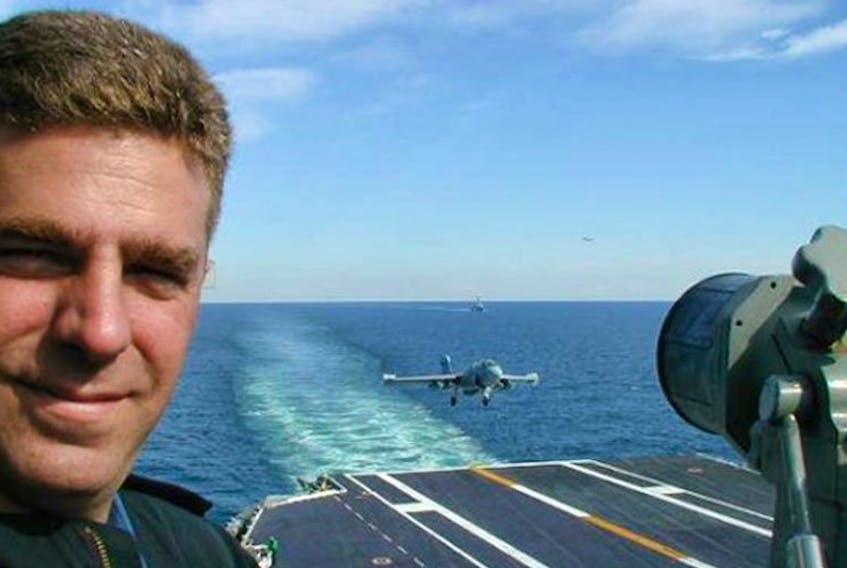Natasha Mohr stubbornly sticks to her promises.
Unfortunately, the Canadian Forces do not, she said.
“Sign on the dotted line, you’ll be taken care of,” Mohr, 49, said of commitments the Forces and the federal government make to military personnel. “And that is not so.”
Mohr said the broken promises to her Lower Sackville family began after Christmas Day, 2008, the morning her husband, Petty Officer Rick Mohr, passed away in her arms of brain cancer that was related to his 22-year naval career.
It took nine long years for Veterans Affairs Canada to begrudgingly agree that his death was service related.
Petty Officer Mohr had been diagnosed with glioblastoma, an aggressive brain tumour, just more than two months earlier.
“He was a brilliant naval communicator and even more so, he was a loving father and husband,” Natasha Mohr said.
Rick Mohr was only 42. His death crushed his wife and the couple’s son and daughter, both in their teens.
“I can’t even describe the devastation,” she said. “It was awful to have to tell my children that your father has brain cancer and then to have to witness them watching their father being buried.
“We were used to having him gone and I think that helped because it was normal for him not to be in the house. But he wasn’t coming back this time. After Christmas holidays, my children had resumed their school schedule, I remember cooking dinner for them … a chicken dinner and I set the table and I brought out four of everything. That’s when it really hit, Wow, this is a permanent thing. How are we going to do this?”
The nearby military family lovingly embraced Mohr and her children. Still, devastation soon led to frustration and despair when she applied for the lump-sum military compensation paid out to the surviving spouse and dependent children of a Forces member after a sudden service-related death.
“When he was diagnosed and we met with his oncologist for the first time, she asked was he exposed to chemicals. And we said, yes. He looked at me and he said, ‘Hon, the Persian Gulf War did this to me.’ He asked me to pursue it on his behalf and I did.”
The nearly decade-long pursuit was fraught with hurdles.
“One of the Veterans Affairs employees stated to me in letter that ‘if Rick’s cancer was due to the Persian Gulf War, it would have presented itself when he was in the war.’ This person wasn’t a doctor. That is like me diagnosing.”
With dogged determination and invaluable assistance from a military pensions advocate, from Harold Davis, president of the Persian Gulf Veterans of Canada, and from Norman Doucet, her MP Darrell Samson’s assistant, Mohr and her children were finally awarded a compensatory payout in October 2017.
They can also draw military pension benefits, retroactive to 2016, but Mohr says the pension benefits should be retroactive to the date of her husband’s death.
Mohr said her husband of 17 years was exposed to unacceptable levels of chemicals like xylene and ethylbenzene while serving in communications roles during tours of duty on at least nine ships.
“There were carcinogens. I have pictures of him in the Gulf, he was not given the proper gas masks. ... At the end of the war when Kuwait was liberated, (Saddam) Hussein went in and gassed everyone.”
Davis, now retired from the military after 32 years of service, was a master corporal on the Athabascan during its almost year-long stay in the Gulf.
“We were all exposed to some (chemicals),” Davis said. “Some have it better than others. Myself, I have some items of what we call Gulf War illness. Other vets are in way worse shape than me. I am trying to help them through Veterans Affairs as well. It is a long road when you are a Persian Gulf veteran.”
Davis said the Gulf War veterans are all but forgotten because none of them were lost in battle. He said Veterans Affairs’ recognition that Rick Mohr died of an illness related to his service is a big deal.
“His name is in the seven Books of Remembrance in Ottawa,” Davis said. “He’s the first Persion Gulf veteran in there. All service persons that die in what they classify as in the line of duty are in that book. His name is in that book now.”
Mohr said her husband asked on his deathbed that she fulfil his wish to have his service to Canada and in the Persian Gulf War recognized by Veterans Affairs.
“Finally they did,” she said. “I’m proud of his service, of all the veterans. They go through so much, they come home wounded and Canada turns its back. That’s what disgusts me.
“If I had known my husband then and I know what I know now, I wouldn’t have let him join. There are young people who I’ve met and I tell them flat out, do not join because you won’t be taken care of.”
Mohr said the monetary compensation can’t bring her husband back.
“There is nothing that can cover that loss. He’s gone and that’s that. But I am comforted knowing that if this happens again to another family that there is now a documented case, finally. Because now we have my sweet husband’s case, it’s been recognized and it’s been awarded a favourable decision, the evidence is there, my hope is that no one will have to go through the nine years of hell that I went through.”
The hell will officially end for Mohr when she and her now-adult children are presented with the Memorial Cross in a small Remembrance Day ceremony at the CFB Halifax chapel. One of the eligibility criteria for awarding the medal to a deceased Forces member is that the death is the result of an injury or disease related to military service.
“I am really pleased about that. It’s going to be sad but it’s the final thing. It’s closed after that. Nothing more has to happen. It’ll be a proud moment. I can feel him still there with me. At that time, I think he will finally be able to rest in peace.”









